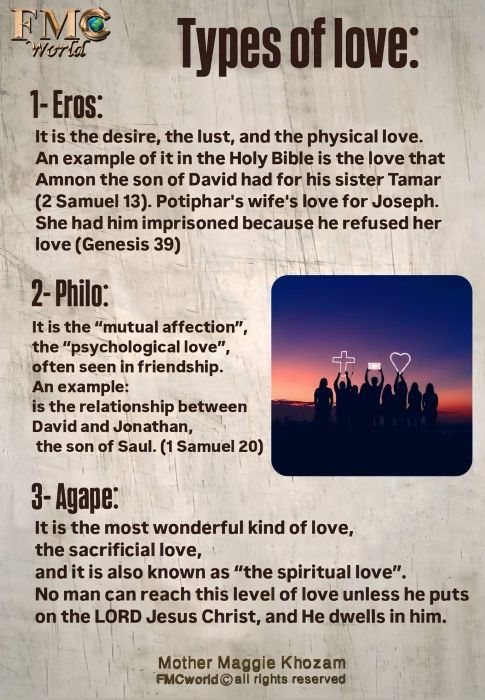

Since the beginning of time, there has been no one in the entire world who does not desire to love and be loved. However, the problem is that love itself, in most cases, causes pain. One of the two may sacrifice more than the other, or one may prefer to take more than they give, or maybe one will hurt and harm the other without any reason. The weaker party in the relationship may overlook the negatives, and they go on to marry, only to find out that they should never have married in the first place. So, is love itself to blame?
Of course not, because love is one of the most sublime human feelings. The issue is that we don’t know what kind of love the other person holds in their heart toward us. Thus, we call all of them “love”; we say about the lust: “he loves me”, about the desire “he loves me”, and about admiration “he loves me” or “he loved me”, although each of these types is completely different and not necessarily true love.
We will review three types of love, which are very important for us to understand. To grasp them correctly, we cannot discuss them using the Arabic language because it is a bit weak in expressing love; therefore, we will turn to the Greek language, where they believed in love goddesses in ancient times and knew how to precisely sort out each type of love. The most important of these types:
1- (Eros): It means desire and lust. It is known as “the physical love”. “Eros” is usually unable to see the other individual as a person, but rather as an object, i.e., he has a specific need, and this “object” fulfills that need.
2- (Philo or Philos): It is “the mutual affection”, and it is also known as the “psychological love”. It means: “Love me and I will love you back. Give to me and take from me”. It is a reciprocal relationship of love, and we often see it in society, especially in friendships, where there is pleasure in both giving and taking.
3- (Agape): This is the greatest type of love. It is the love of sacrifice, and it is also known as the spiritual love because it is not based on the merit of the other person, whether he gives or does not have anything to offer. It is neither affected by the person’s look nor by his beauty, not even if he is tired, sick, or weak: “I love him because I love him”.
The Holy Bible gives us examples regarding these three types:
1- Eros:
Amnon, the son of David when he fell in love with his sister Tamar. The Arabic version of the Holy Bible uses the word “he loved”; however, if we look at the Greek origin, we will see it as “Eros”, because he desired his sister. Because of the love of lust, he was unable to distinguish that this is forbidden, as the person in the “Eros” kind of love will do whatever he wants regardless of the commandments, law, life, shame, the forbidden actions…etc., so Amnon pretended to be ill, had his sister Tamar come to his home to serve him, and then he raped her.
The Holy Bible mentions a verse that reveals the true nature of “Eros”, where it says: “Amnon hated her greater than he had loved her”
2 Samuel 13:15 “Then Amnon hated her exceedingly; so that the hatred wherewith he hated her was greater than the love wherewith he had loved her.”
But why?! Because he had already taken what he wanted from her.
Furthermore, in the story of Joseph in Genesis 39, Potiphar’s wife had attempted to seduce Joseph, but when he refused to betray his master’s trust, she caused Potiphar to throw him unjustly into prison because she accused him of assaulting her.
This is the love of “Eros” that will destroy you regardless of whether it doesn’t get what it wants from you, or it does.
Therefore, flee from this kind of love, for it will deeply harm you, even if it ends in marriage. You’ll be facing a partner who knows how to take, but not how to give.
2- Philo:
We usually see the “Philo” in friendships, and even in marriage, which is based on a give-and-take form: “Give to me and I’ll give to you.” “Buy something for me and I’ll buy something for you.” “What you do for me, you will receive from me.”
Philo is the mutual psychological love; the best example of this type of love is in (1 Samuel 20), in the Holy Bible, in the relation between David and Jonathan, the son of Saul.
David was the future king of Israel, and Jonathan was the son and the heir of the current king Saul, so the relationship between the two was supposed to be that of two enemies; however, the friendship and love that united them led them to define their relationship differently. They both chose to prioritize the best interest of the nation, not their own. So, each of them gave the same promises to the other, for example: “You do not hurt me, and I will not hurt you. You will respect my children, and I will respect yours. We will not approach each other with ill intent, and if either one of us feels that the other is in danger, he will give a warning.” This is the mutual brotherly love that bound them. Of course, there are many other examples in the Holy Bible of this type of mutual love.
3- Agape:
It is the highest and best form of love. The greatest example of it is Christ Himself, as no human can attain this level of love unless he puts on Christ, and He dwells within him.
Agape means to sacrifice, to love, and to give regardless of who is in front of me. For whom was Jesus Christ crucified?!
He was looking upon the very people whose sickness He had healed, whose suffering He had relieved, from whose children He had banished demons, yet they were shouting “crucify Him…crucify Him!” (Luke 23)
“His blood be on us, and on our children.” (Matthew 27)
He was looking at His disciples, with whom He spent three years, while they were forsaking Him and fleeing. (Matthew 26:56)
He was looking at Peter, who had betrayed and denied Him three times, though he used to say: “Though I should die with thee, yet will I not deny thee”. (Matthew 26:35)
However, he was the first to betray Him, saying: “I do not know the man.” (Matthew 26:72)
He also looked at Judas, His own disciple, the one whose feet He had washed, whom He had given food with His own hand, with whom He had broken bread, and who was entrusted with the money bag, yet Judas delivered Him for thirty pieces of silver; he sold and betrayed Him. (Matthew 26:15)
And the most difficult part of all this is that He already knew them, He knew in advance what they would do to Him. Yet still, He fulfilled His mission to redeem humanity, including those who were undeserving. He did not look at their unworthiness, because His love knows no conditions and knows only how to give. In fact, He even asked the Heavenly Father to forgive them during the most difficult moments of His life, while hanging on the cross.
Luke 23:34 “Then said Jesus, Father, forgive them; for they know not what they do.”
We also clearly see Agape love in what happened between Christ and Peter after the resurrection, in (John 21). When the LORD Jesus prepared a meal of fish for them, He said to Peter: “Simon, son of Jonas, lovest thou me?” Peter replied: “I love you, LORD.” He repeated it one more time: “Simon, son of Jonas, lovest thou me?” Peter looked at Him confused, wondering why the LORD was repeating it for a second time! Peter replied: “I love you, LORD.” He then repeated it for the third time: “lovest thou me?” Peter was grieved because He repeated it for the third time, for Jesus is the LORD who “knowest all things”, and He knows that Peter loves Him.
But why did Jesus ask him three times?
The meaning is not, as some people explain it, because Peter had denied Him three times.
Let us go back to the original Greek to see how Christ had asked and how Peter had replied. Jesus said to Peter: “Simon, son of Jonas, Agape?”
Agape means: Do you love Me unto death without expecting anything in return? Simon Peter replied and said: “Philo”.
Philo means: I love you. It is mutual love, like the love many Christians have for Christ today: “I love You, but not so much as to quit my job for You. I love You, but not to the point of dying for the sake of evangelizing Christ. Yes, I love Jesus, but no more than I love my children. Yes, I love Him, but as much as He gives me. I pay my tithes, but I expect blessings at the end of the month. I pray and fast when I’m in need, and I complain if He doesn’t fulfill my wishes.”
This is “Philo”: I love Him, but to a certain extent, depending on how much I benefit from Him.
Christ cannot use someone who does not love Him without expecting anything in return. I should be filled with the love of Christ, whether He gives me something in return or not, whether He heals me or not, for I seek nothing from Him but His pleasure. I love Him because I love Him. Only then will you reach the point where Christ can entrust you with His flock and say to you, as He said to Peter: “Feed My sheep.”
Therefore, the second greatest commandment of Christ, the one that comes directly after “thou shalt love the LORD thy God” and is just as important: “Thou shalt love thy neighbour as thyself.”
February / 14 / 2021